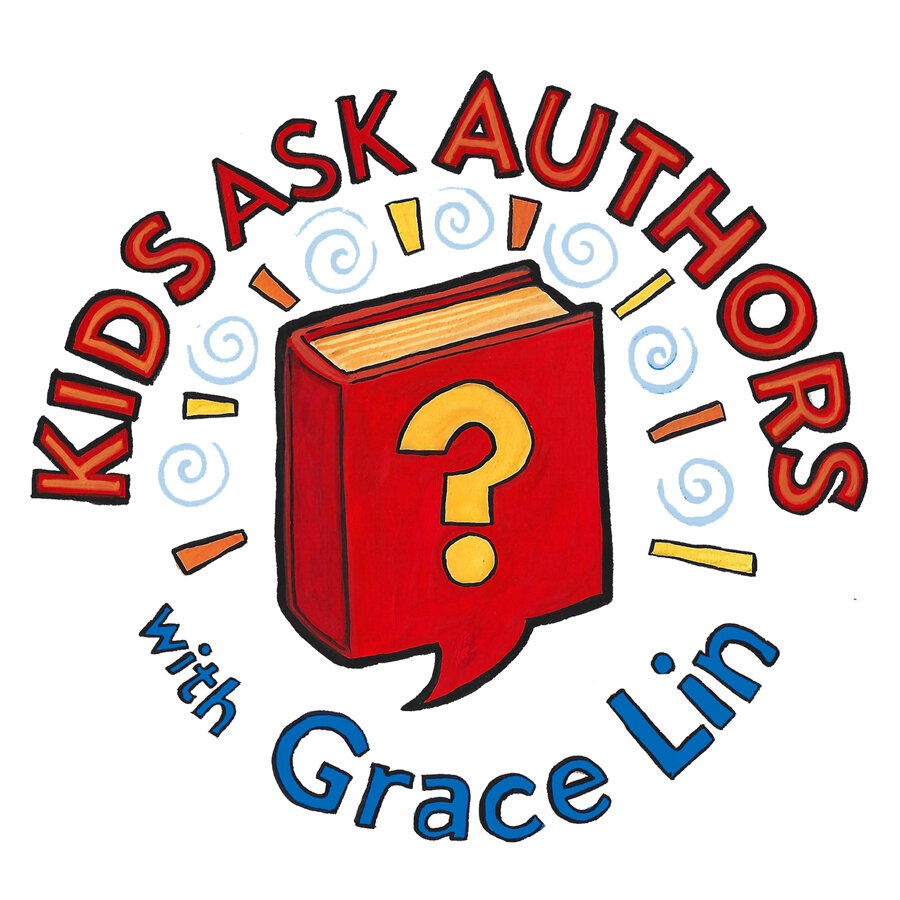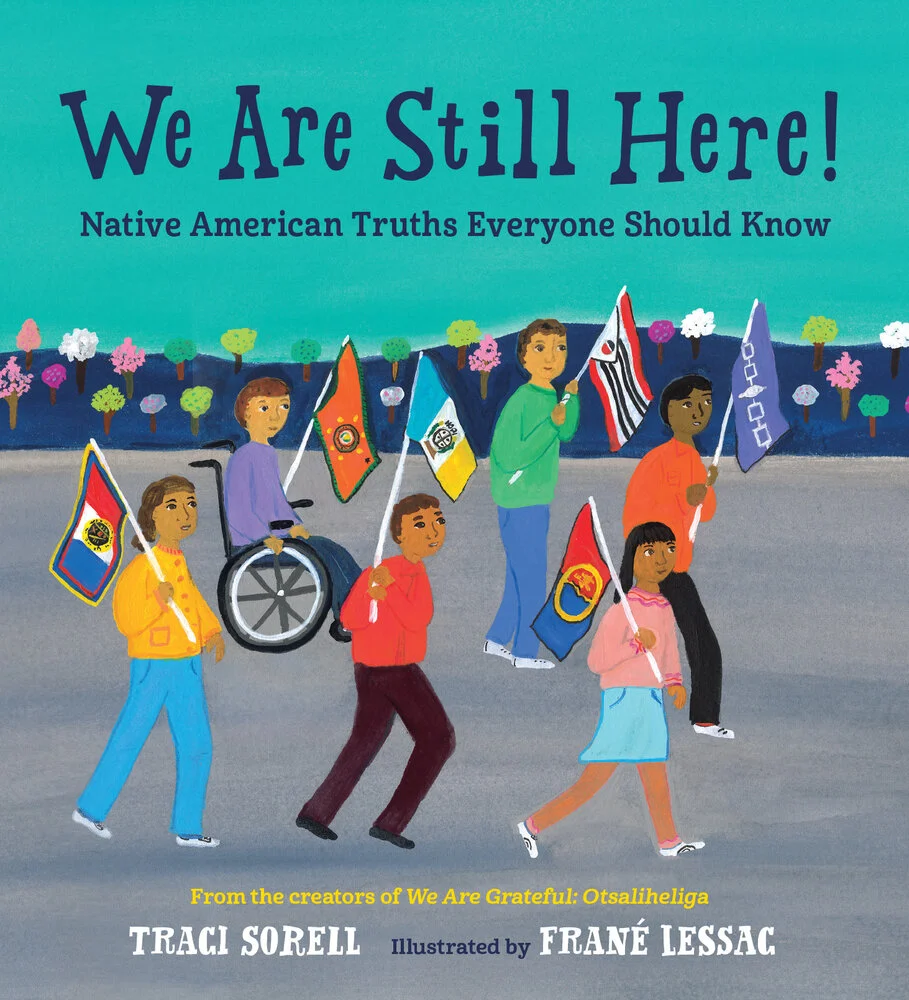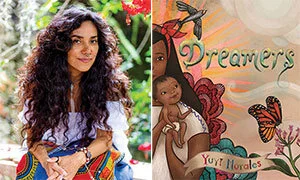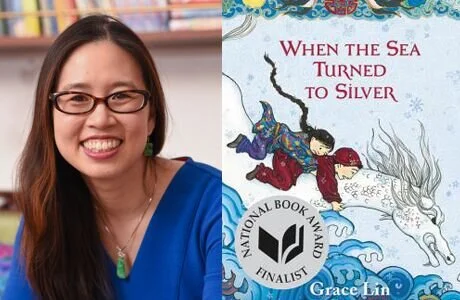Episode #86: Do you make a rough draft first of the story and then make the pictures? -with Yuyi Morales
Welcome back to another great Kids Ask Authors episode! Authors Grace Lin and Yuyi Morales answer the kid question; “Do you make a rough draft first and then make the pictures?”
TRANSCRIPTS:
Grace Lin: Hello. I'm Grace Lin, children's book author and illustrator of many books, including the middle-grade novel, When the Sea Turned to Silver, and the picture book A Big Mooncake for Little Star. Today, I'm here with Yuyi Morales, the author and illustrator of the beautiful picture book Dreamers. Hi Yuyi.
Yuyi Morales: Hi, Grace.
Grace Lin: Thank you so much for coming today. I'm so excited to be talking to you.
Yuyi Morales: I'm excited to be talking to you too.
Grace Lin: Okay. Are you ready for today's kid question?
Yuyi Morales: Yes, I am.
Grace Lin: Okay. Today's kid question is from a young person named Kaia and they ask...
Kaia: Do you make a rough draft first of the story and then pictures?
Grace Lin: Do you make a rough draft first of the story and then make the pictures?
Yuyi Morales: Yes. Yes. Although, this change from book to book. There are some books where I write a story, a story that I know is going to change, but I concentrate in writing the story first and later I worry, I don't even worry, but I will take care of how the visuals come to me. However, there are some books like, I don't know if you're familiar with my book, Nino Wrestles the World.
Grace Lin: Yes.
Yuyi Morales: In Nino Wrestles the World, there was more of a back and forth and where sometimes the illustrations, as I was making the illustrations, they will take over and I would need to say some things in the text. So more and more, my books are very intertwined in a way that not necessarily the story or the words in the story will be telling what's happening, but it's more like a guide. It's my map.
Yuyi Morales: And a map that might change. At the end, the result will be different and it might not be the words as I wrote them at the beginning, because it's just a way to tell me what direction I want to go. And it is like that. It's like a compass or a map, where I will find my destination little by little as I work it. As I start writing more, as I start making some of the pictures then eventually I find my way and it might not even have been the place where I thought I was going to go at the beginning.
Grace Lin: Wow. I love that. I love the idea of the story that you write is the map for your pictures. And that's such, that's such a beautiful way of looking at it. And actually, honestly, it's, it's similar to how I do it too, because I write the story, but then I do the pictures and as I'm doing the pictures, I'm always, usually cutting and cutting all the words out. Usually I write the story just so I can sell the idea to the publisher and then I'm cutting and cutting. Because I know it's going to change once the pictures come through.
Yuyi Morales: Absolutely. Yes.
Grace Lin: How did it work for your picture book, Dreamers? Did you have like a rough map, like you said for that book as well?
Yuyi Morales: Yeah, that one, it took me a long time to write that story because if you are familiar with Dreamers, it is a story that is inspired in my own story. In my story, as a person who came from one country into the United States as an immigrant. And when I came to United States, I was already an adult. So when I thought that I wanted to tell the story, at the beginning, I had a hard time figuring out how a story written by an adult was going to be something that could speak to children, that children will feel connected to it.
Yuyi Morales: So at the beginning I made many different drafts, and it was even longer and I wasn't going to do short stories, but then finally, one day I decided like, I'm going to make this just almost as if I'm breathing, I'm going to breathe in. And I'm just going to breathe out a text that, that summarizes more than my story, like the things I learned when I became an immigrant.
Yuyi Morales: And so I wrote that story first, like that. What is what I wanted to say that I have learned, even things that before I thought were true. And then I realized it wasn't true. Like for example, the fact that I always thought that I came to the United States with nothing that I have come and I have been received and I brought nothing to give and, and that changed. And I learned that that was not true.
Yuyi Morales: When I came to United States, like many other people, like immigrants have come to a new place, we bring a lot of presents with us. So when I pay attention to that part of new knowledge that I had, something that was a realization, then I knew I, I could write a story and I did it.
Yuyi Morales: I wrote the texts first. And then later is like, not only how am I going to solve the text it's more like, how am I going to breathe all the other stories that are inside that first few words that I wrote? Those other truths and stories are told in the illustrations.
Grace Lin: Oh, that's so beautiful. I love that. I love how you came to the realization that you didn't come empty handed, and that's such a beautiful message to get across because I do think ... My parents were immigrants too. I guess it's kind of the cliche. It's like you, the immigrant, my parents actually weren't like this, but the idea of immigrants coming with only the shirt on their back, and the realization that they came with so much more is so important.
Yuyi Morales: Yes, yes, exactly.
Grace Lin: I wanted to touch one thing about how we were talking about how you make the story. One thing you said is that sometimes you write the story and then it changes when you do the picture, like the ending changes. And that's a little different for me because when I write the story, I write the story and I write the beginning and the middle of the end and all the stuff in the middle might change while I'm doing the pictures, but the end is always the same. I've never had the ending change. But you've had the ending change. Is that right?
Yuyi Morales: Yes. Yes. I have changed because for me, when writing the story, which is kind of like the beginning, it is like an invitation to find out really what's going to happen. It's like opening this door. I wrote some words and those words are like my magic pass that allows me to go through a door in which I'm going to explore this story. So I know that even if I already wrote the text and I have figured out the story, and even the ending, it might happen.
Yuyi Morales: Like right now, I'm making a book and it is as I'm finishing the last images of this book that I'm realizing exactly how I'm even sort of surprising myself about what's happening at the end? Because it is something that I find. It's not something that I can just create in my mind. I really build it. I construct it. And at the end, I even surprise myself sometimes with what I have finally said with my book.
Grace Lin: Can you give us an example of a book where you had written the ending one way, but the book turned out with a different ending?
Yuyi Morales: It isn't so much that it changes, but that it shows much more than what I had imagined. Dreamers is one of them. In Dreamers, I, like I said, I found that I was telling an immigrant story. And at the moment I didn't understand so much even why I was supposed to tell my story. So I tried to be very, very brief and just say the things that at that moment I thought were important.
Yuyi Morales: For example, the fact that to me, finding the public library was a moment, a life changing moment. And for some time I thought that was the heart and also the solution of my story. So I wrote it at first, thinking that entering the library, recognizing that the library was a place in where I wanted to make my life, that I wanted to make books like the ones I saw there that I fell in love with them, that they became a home for me and my son.
Yuyi Morales: That's when I felt that was the end of my story. And then as I kept working on it, I realized that that was just one of the elements. And it is an important element of that story. But what was even more important was this realization that ... You know how sometimes we adults have this idea that we are doing things for kids, because so that they can grow and be better? And maybe that doesn't happen to you, but sometimes the adults around me and even me, I feel like, okay, I'm going to do this for the children. And when I was making the book, I realized like, no, children are the ones who are giving us the most magnificent gifts. There is nothing I need to change in a child. A child is already perfect and I just went up, honored them. And so the last pages of my book, I did, I change it eventually.
Yuyi Morales: It turned out to make a point that for me was important, which is, it says something like, Someday we will become something we haven't already yet imagined," or "even imagined," but we already are because I didn't want to make it important that children had to transform themselves so that they can be constantly ... That they will be valued and appreciated in this world.
Yuyi Morales: And I make an emphasis in the illustrations and in that text. I also changed the text so that I could acknowledge that we already are plentiful, that children are already plentiful. And they don't need to transform into something better because they already are better. And that it is more like our job to recognize just how perfect, how valuable they are. And that even if they didn't grow more with our books or anything, where they are right now is exactly what we honor and what we welcome, and what we love.
Yuyi Morales: I did that in my book, I changed the text and I made sure that in the illustrations and over all the elements that told the story, that that was my message. I don't want children to change so that we all can become better. I want children to be exactly who they are so that we can recognize that we already have all those presents that children bring to our world.
Grace Lin: That's so lovely. Oh, I'm so glad that you shared that. Well, I feel like that's a good place to stop then, leaving it on that lovely note. So thank you so much for answering today's kid question and thank you Kaia for asking it. Bye.
Yuyi Morales: Bye.
Today’s BOOK REVIEW comes from Ethan! He is reviewing, We Are Still Here! Native American Truths Everyone Should Know, written by: Traci Sorell and Illustrated by Frane Lessac.
My name is Ethan and the book I would like to talk about is We are Still Here! Native American Truths Everyone Should Know written by Traci Sorell and illustrated by Frane Lessac. This book is about learning the truths of Native American history. I learned that when the Europeans moved into North America, this was a historical moment for the Native Americans. There are hundreds of tribes that make up the Native Nations who have their own governments, languages, and cultures. The U.S. government and Native Nations signed treaties, but the government didn’t keep their promises. The government also separated the Native American families where children had to leave their parents to go to boarding schools to learn American ways and culture. I like this book because it brings attention to how Native Americans have survived and are still here. The Native American ways of singing and dancing were stopped, but their spirit will never break. Everyone should read this book because it teaches you about Native American history, culture, and rights.
Thank you so much Ethan!
More about today’s authors:
Born in Mexico and raised among giant grandmothers, mossy house walls, and rampaging feral gardens, Yuyi Morales fostered a strong bond with the magical stories that ran in her family. Since having immigrated to the USA in 1994, she has drawn from her family's legacy and her heritage to create some of the most celebrated Latino works for children's books. Yuyi won the Pura Belpre Medal for Illustration in both 2004 and 2008. Yuyi (born in Xalapa, Veracruz, Mexico on November 7, 1968) is an author and illustrator of many notable and award-winning children's books. Some of her most famous books include Just a Minute: A Trickster Tale and Counting Book, Little Night, and Viva Frida, which received the 2015 Pura Belpre Medal for illustration as well as the 2015 Caldecott Award Honor. Morales is the first Latina to receive the prestigious Caldecott Award.
Grace Lin, a NY Times bestselling author/ illustrator, won the Newbery Honor for Where the Mountain Meets the Moon and her picture book, A Big Mooncake for Little Star, was awarded the Caldecott Honor. Grace is an occasional commentator for New England Public Radio , a video essayist for PBS NewsHour (here & here), and the speaker of the popular TEDx talk, The Windows and Mirrors of Your Child’s Bookshelf. She is the co-host of the podcast Book Friends Forever, a kidlit podcast about friendship and publishing (geared for adults). Find her facebook, instagram , twitter ( @pacylin) or sign up for her author newsletter HERE.
Special thanks to the High Five Books & Art Always Bookstore, Ms. Carleton’s 2nd grade class at Jackson Street School for their help with our kid questions and reviews.






